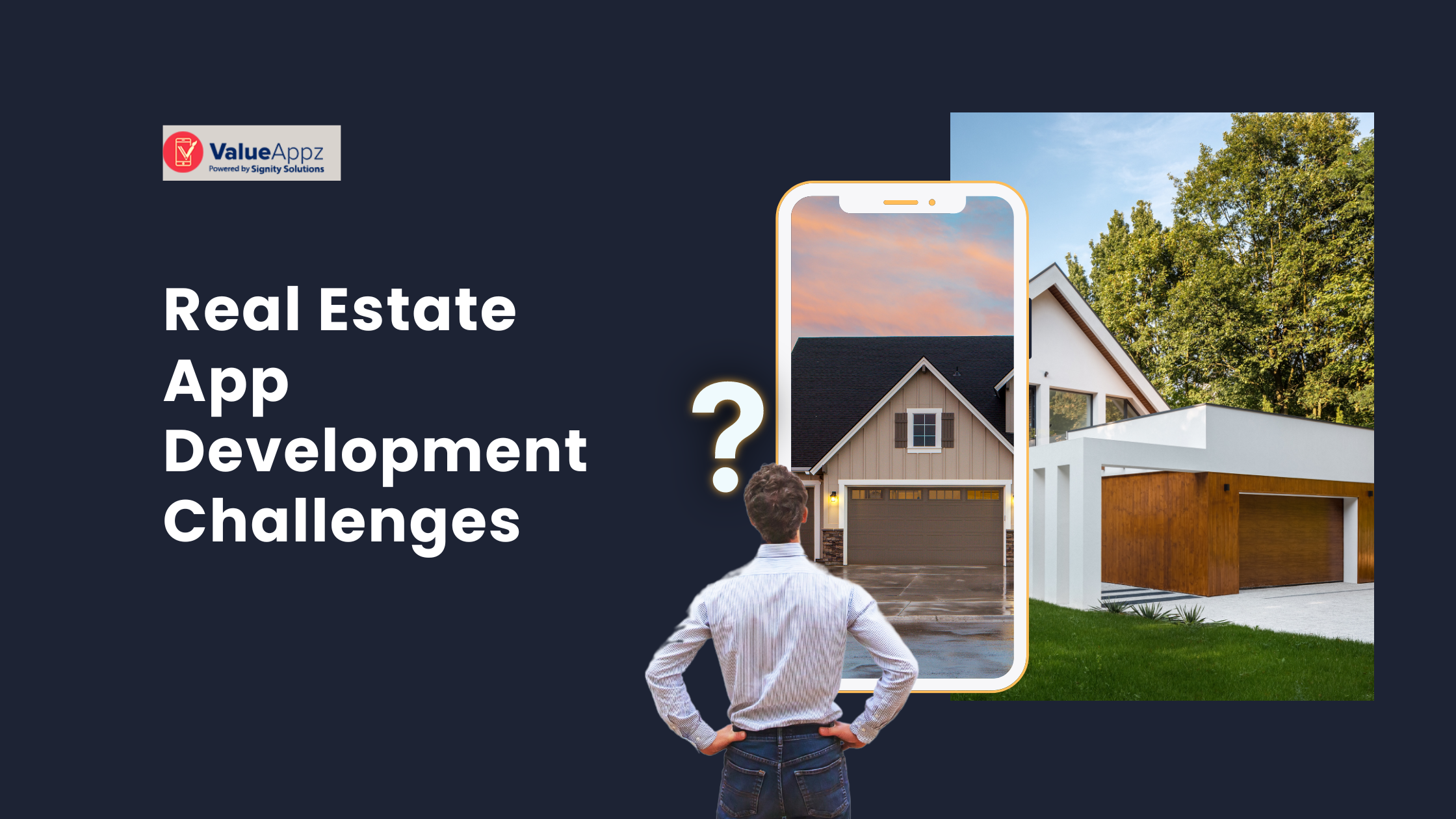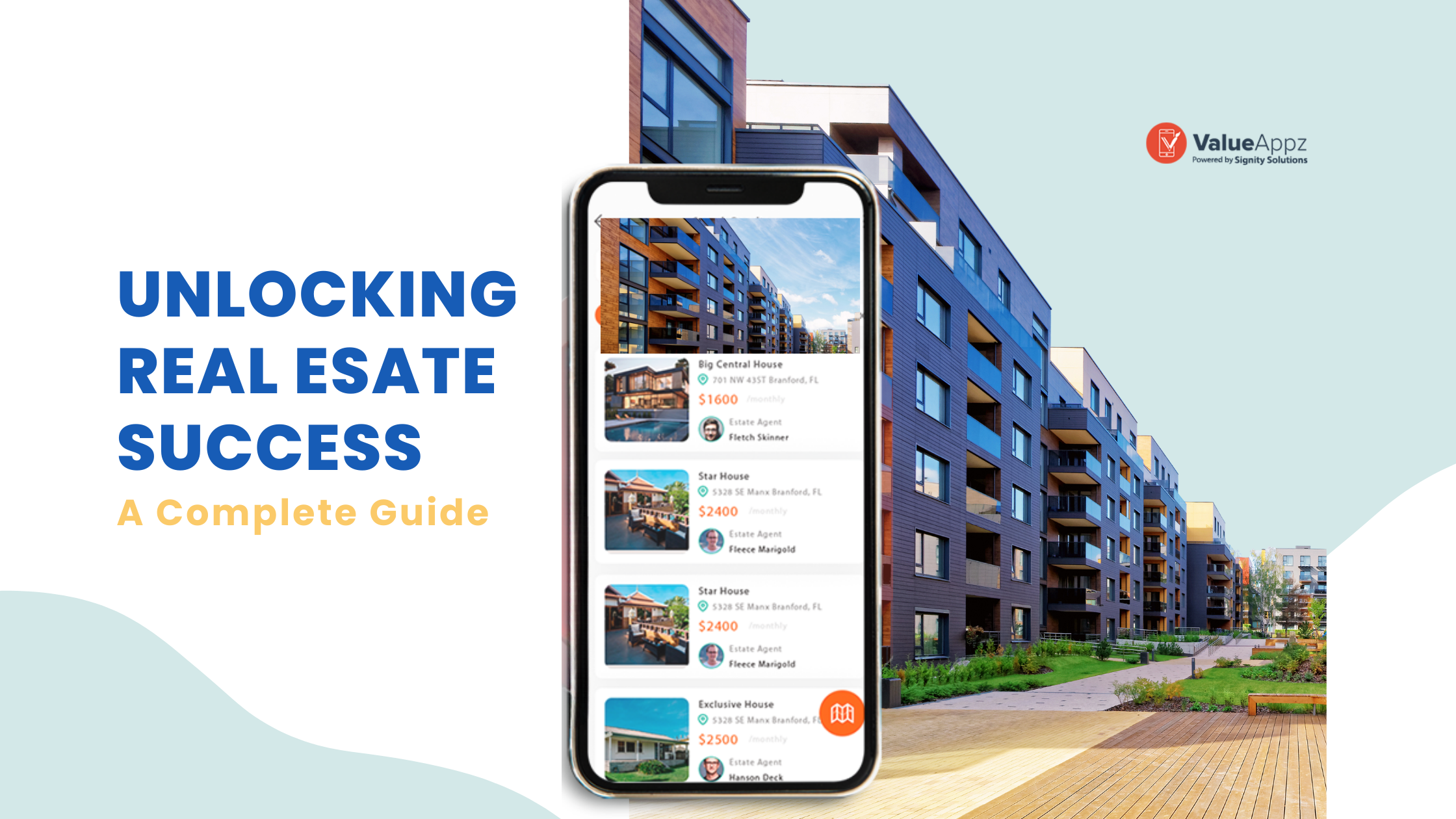Overcoming Common Challenges in Real Estate App Development

Quick Summary: Have you faced challenges while building a real estate app? Whether it’s about choosing the right team at a reasonable cost or updating the app with the latest trends, the challenges are a lot. This blog covers the top challenges in real estate app development and the right solutions for it.
Real estate apps have witnessed significant growth in the previous years. As per the reports, the global real estate software market is projected to reach $15.8 billion by 2027.
With the rising demand, a number of startups and small businesses are moving towards real estate mobile app development to provide a seamless experience to users.
Often, entrepreneurs face challenges when building a real estate app. From choosing the right technology to finding the best app developers, picking the app features, and building the app under the budget, the list keeps going on.
This blog will list all the real estate app development challenges and provide the best solution for each.
So, let’s get started.
Table of Contents
Real Estate App Development Challenges and the Solutions
Whether you want to build an Android app or iOS, you might face several challenges during the development process. Check the list below and get the best solutions for it.
1. Considering the Real Estate App Development Cost
One of the biggest challenges of building a real estate app is developing it under the right budget. Small businesses and startups often face problems finding the right real estate app development company. A number of businesses usually drop the idea of creating the app due to development costs.
Solution:
The best way to overcome this real estate app development challenge is to be aware of the cost. But how much does it cost to build a real estate app? On average, the real estate app development cost ranges between $50,000 and $100,000.
2. Security in Real Estate Apps
Another major challenge in building a mobile app for real estate business is ensuring complete security. There is sensitive data of potential buyers and real estate agents that must be protected. Hence, robust security features are a must to ensure that users’ data is secure all the time.
Solution:
To ensure high security in real estate, it is essential to add the right features. Further, security is a multi-layered approach that includes data encryption and secure communication protocols, along with multi-factor authentication for logins.
3. Engaging User Experience in Real Estate Apps
Until and unless the real estate app does not provide an alluring experience, it doesn’t have the chance to stand out. It is challenging for business owners to understand what exactly their users need and what elements must be added to it. From choosing the right colors to features interface and making the mobile app visually attractive, there are several challenges.
Solution:
Design is not just about the look; it is also about designing an interface that is visually appealing, easy to navigate, and lets users easily find what they need. It can be done by adding the right features and developing the app with the right colors and design elements.
4. Data Integration for Real Estate Apps
Data integration is another real estate app development challenge. Real estate mobile apps often need to pull data from multiple sources like property listings, demographic information, and mapping services. Integrating these different data sources can be a challenge.
Solution:
Real estate mobile apps can achieve seamless data integration through a robust strategy like utilizing well-documented APIs to connect with sources such as MLS or mapping services. For instance, at ValueAppz, we provide pre-integration services like payment and mapping to ensure that our clients do not have to struggle during the development process and that the mobile app provides a great user experience.
5. Standing Out in the Competition
With the rising competition in the real estate industry, it is difficult to build an app that enables businesses to stand out in the market. With various apps providing similar features like property listing, open house listings, and search functions, it is quite challenging to build a real estate app that retains the audience.
Solution:
One of the best ways to ensure that the app stands out in the competitive market is to identify the business USPs. It can involve innovative features like augmented reality tours, AI-powered market analysis, or a strong focus on a specific niche like eco-friendly properties.
Want to lead the real estate industry? Check the complete guide to build an engaging real estate app for a successful business.
6. App Scalability
Once the app grabs the audience, it is difficult for real estate companies to reach a wider market. Ensuring that the application can seamlessly handle an increasing number of users, manage a surge in data, and support new features is crucial. Additionally, planning for scalability from the initial stages of development is essential to prevent issues related to system overload, slow loading times, and the risk of the application crashing when faced with a high influx of users.
Solution:
In addressing scalability challenges, real estate apps can leverage cloud-based infrastructure, such as AWS or Azure, to ensure seamless handling of increased traffic and data storage requirements. Implementing efficient caching mechanisms, optimizing database queries, and conducting thorough load testing are essential for enhancing app performance and scalability.
7. Managing User Expectations
Another challenge of building a real estate app is keeping it updated with users’ latest demands and needs. Building a real estate app is not just a time task. It requires regular updates based on the users’ feedback and changing demands.
Balancing these expectations with the practical limitations of data accuracy, technology constraints, and market dynamics requires careful communication, transparency, and the implementation of features that offer value and utility to users.
Solution:
To effectively manage user expectations in real estate app development, it is crucial to prioritize transparency and clear communication with users. Setting accurate expectations through detailed property information, regular updates on market conditions, and providing clear guidelines on the app’s functionality can help align user expectations with the app’s capabilities.
Offering robust customer support, implementing user feedback mechanisms, and continuously improving the app based on user preferences and trends are essential strategies to enhance user satisfaction and loyalty.
8. Keeping Data Fresh
Keeping data fresh in real estate app development is a challenge due to the dynamic nature of property listings and market conditions. Ensuring that the app provides real-time updates on property availability, pricing, and relevant market trends demands seamless data retrieval, processing, and integration.
Additionally, maintaining accurate and up-to-date property details, images, and multimedia content while managing a large database and ensuring the consistent delivery of timely information to users adds complexity to the app’s data management processes.
Solution:
To address the challenge of keeping data fresh in real estate app development, leveraging real-time data feeds from trusted sources, implementing automated data update processes, and employing data caching and synchronization mechanisms are essential. Utilizing technologies such as web scraping, APIs for property listings, and data streaming services can ensure that the app’s information remains current and relevant
9. Targeting the Right Audience
Targeting the right audience presents a challenge in real estate app development due to the diverse and intricate nature of user preferences, property requirements, and market segments. Identifying and understanding the specific demographic profiles, socio-economic factors, and lifestyle preferences of potential users is essential for tailoring the app’s features, content, and marketing strategies to effectively engage and appeal to the target audience.
Solution:
In addressing the challenge of targeting the right audience in real estate app development, conducting comprehensive market research, leveraging user analytics, and employing personalized content recommendations based on app user behavior and preferences are crucial. Implementing targeted marketing campaigns, utilizing social media and digital advertising platforms, and fostering partnerships with relevant industry influencers can help reach and engage the intended audience effectively.
Build an App With Real Estate Industry Experts at ValueAppz
Want to create a real estate app where you do not have to face challenges during the development process?
Meet the experts at ValueAppz for the best real estate app development solutions. Our team works with the latest tech stacks and provides pre-integration services to ensure quality.
Get in touch with us today and get a free quote.
Key Takeaways
- The real estate software market is set to reach $15.8 billion by 2027, prompting startups to develop seamless real estate apps.
- Developing a real estate app costs $50,000 to $100,000. Managing costs and finding the right development partner are crucial.
- Protecting user data with strong security features and creating an engaging, intuitive user experience are essential.
- Integrating data from various sources and ensuring app scalability for growing user demands are key challenges, solvable with robust APIs and cloud infrastructure.
Frequently Asked Questions
Q1. What are the best practices for designing an intuitive user interface (UI) for a real estate app?
Conduct thorough user research, create wireframes and prototypes, implement user feedback loops, and follow design principles that prioritize simplicity and ease of navigation.
Q2. How can we ensure the accuracy and timeliness of property listings in our app?
Implement robust data validation processes, establish reliable connections with multiple listing services (MLS), and use automated systems to regularly update property data.
Q3. How can we build an app that scales effectively with increasing user numbers and data volume?
Use scalable architecture such as microservices, leverage cloud services for flexible resource management, and perform regular performance testing to discover and address potential bottlenecks.
Q4. What measures should we take to ensure the security and privacy of user data in our real estate app?
You must implement strong encryption for data storage and transmission, conduct regular security audits, adhere to data protection regulations (e.g., GDPR, CCPA), and use secure authentication methods.
Q5. How can we enhance the search and filter functionality to meet diverse user needs?
Develop a robust search algorithm, provide multiple filter options (e.g., price range, location, property type), and continuously improve these features based on user feedback and behavior analysis.
THE AUTHOR
Amrita Singh
With a background in Digital Marketing spanning over five years, I bring a unique perspective to my writing and have developed a keen understanding of the ever-evolving digital landscape. I focus on creating content that is relevant and easy to understand.

Get ready to digitally transform your business.
Let our team help take your business to the next level. Contact us today to get started on finding the perfect solutions for your business needs.








